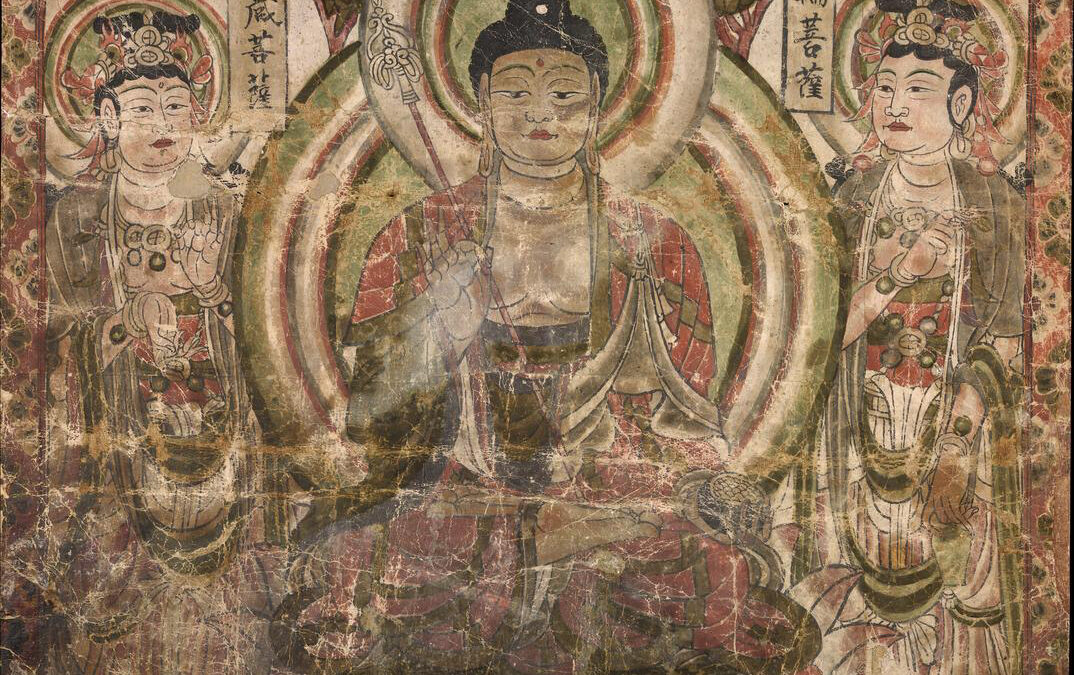A Dunhuang painting featuring the Bhaiṣajya-buddha seated between Avalokiteśvara and Vajragarbha (925-975), (source: IDP)
“The Healer-King Curing the Three Poisons, while the Master Navigator Overcomes the Nine Misfortunes”
An International Conference on Buddhism and Medicine from an Interdisciplinary and Global Historical Perspective
醫王療三毒、航師度九厄:
全球史與交叉學科視閾下的佛教與醫療國際研討會
Aug. 30-Sept. 2, 2024
Magdalene College, University of Cambridge
| Abstracts | Panelists | Schedule | Reports |
This conference is sponsored by the Glorisun Charity Foundation 旭日慈善基金, administered by the Glorisun Global Network for Buddhist Studies 旭日全球佛教研究網絡 (https://glorisunglobalnetwork.org) and FROGBEAR at the University of British Columbia (www.frogbear.org), and hosted by the University of Cambridge. It will take place from August 30, 2024 to September 2, 2024 in Magdalene College, the University of Cambridge.
The Buddha, who abdicated the world to contemplate the sufferings of birth, aging, illness, and death, earned the title of ‘Supreme Healer’ (Da yiwang 大醫王) for his commitment to mitigating worldly suffering. Buddhist teachings, likened to Agada medicine, target the eradication of the three poisons afflicting sentient beings. Buddhist monastics, likewise, are expected to master the ‘Science of Healing,’ a crucial segment of the five branches of Buddhist Sciences, utilizing this knowledge to provide relief and aid to those in critical need. Among the narratives in the Buddha’s biography, we find Jīvaka, the celebrated royal physician, renowned for his medical care to the Buddha, various kings, and the monastic community.
The vast heritage of Buddhist medical literature, available in a variety of languages such as Sanskrit, Pali, Tibetan, and Chinese, showcases a rich collection of texts focused on the Medicine Buddha and a wide range of medical subjects. Specifically, within the extant Chinese Buddhist medical literature, there exist at least 870 texts. These writings cover an extensive range of topics, from the core principles of Buddhist medicine and clinical methodologies to health maintenance practices throughout South Asia, Central Asia, and East Asia. Addressing aspects like etiology, symptomatic treatment, pharmacology, surgical techniques, rehabilitation, preventive healthcare, and end-of-life care, the Buddhist tradition has made substantial contributions to premodern medical knowledge.
To address the rich layers of medical knowledge embedded in the Buddhist literature and the complex history of Buddhism’s cross-border and cross-cultural impacts through the medium of medical science, this conference invites interdisciplinary study of Buddhism and medicine by focusing on subjects that include, but are not limited to:
- Buddhist medical practices in India;
- Buddhist medical practices in Central Asia;
- Buddhist medical practices in Southeast Asia;
- Buddhist medical practices in China;
- Buddhist medical practices in Korea and Japan;
- Cross-border studies of Buddhist medical practices;
- The role of Buddhist medicine in the formation, development, and transformation of East Asian societies;
- Modernization of Buddhist medical practices;
- Sociological studies on Buddhist medicine;
- Relationship between Buddhist medical practices and the spread of Buddhism;
- Buddhist medical literature;
- Bhaiṣajyaguru-related Texts and Images;
- Bhaiṣajyaguru faith;
- Significant figures in the history of Buddhist medicine.
Following Buddhism’s introduction to China, Chinese Buddhists notably employed medicine as a vehicle for disseminating its doctrines. This approach led to the emergence of numerous distinguished monastic physicians and the incorporation of medical literature within Buddhist monasteries. From the medieval era onwards, the founding of medical facilities, like the ‘Compassionate Care Clinics’ 悲田養病坊 within monastery grounds, significantly advanced public health in premodern China. The management of tropical diseases, for instance, was markedly improved by Buddhism’s migration from the tropical landscapes of India to China, safeguarding the lives of many people who relocated southward in the aftermath of the Yongjia Era (424-453) Upheaval. Moreover, Buddhist contributions have extended beyond merely treating illnesses ; the wealth of medical knowledge, detailed clinical case studies, and pivotal breakthroughs documented in biographical and historical texts, along with other Buddhist writings, have profoundly influenced the trajectory of Asian medical progress.
Buddhism has significantly influenced the spread of medical knowledge in Asia, especially in East Asia. In the glocalization process—a dialectical interplay of global integration and local adaptation—medicine, encompassing knowledge, literature, and practitioners, has emerged as a distinctive conduit. Through globalization, Buddhism has melded with the local cultures it encounters, achieving localization. Conversely, Buddhism that has been localized adopts innovative methods to expand into new territories, thus allowing locally adapted Buddhism to spread and evolve globally in a dynamic and layered fashion. The primary agenda of this conference is to delve into the complex and layered relationship between Buddhism and medicine across history, utilizing an interdisciplinary and multimedia approach to shed light on their global interactions.
The interplay between Buddhism and medicine transcends mere academic study of historical practices. In the present day, this dynamic interaction persists as Buddhism engages with the constantly evolving cutting-edge technological advancements in our era characterized by a heightened degree of globalization and glocalization. Contemporary Buddhist monastics and organizations are increasingly integrating medical philanthropy as an expression of the Buddha’s compassion, actively participating in international relief efforts and epidemic prevention. This approach marks a significant evolution in the Buddhist approach to healthcare. Consequently, it is imperative for the international scholarly community to broaden their perspective, reassessing the relationship between Buddhism and medicine both historically and in the contemporary context, to fully appreciate its evolving impact and significance.
The conference organizing committee welcomes submissions on any related topics. The costs associated with attendance, including accommodation and meals during the conference, will be covered by the organizers. Depending on the availability of funds, full or partial travel grants may be provided to participants in need. Please email your research proposal and curriculum vitae by April 15, 2024 to <frogbear.project@ubc.ca>.
The conference will result in the publication of a collection of papers in both Chinese and English. Scholars who are confident in completing a draft of their paper by the end of July 2024 and can complete a publishable paper by the end of November, 2024 are encouraged to apply.

